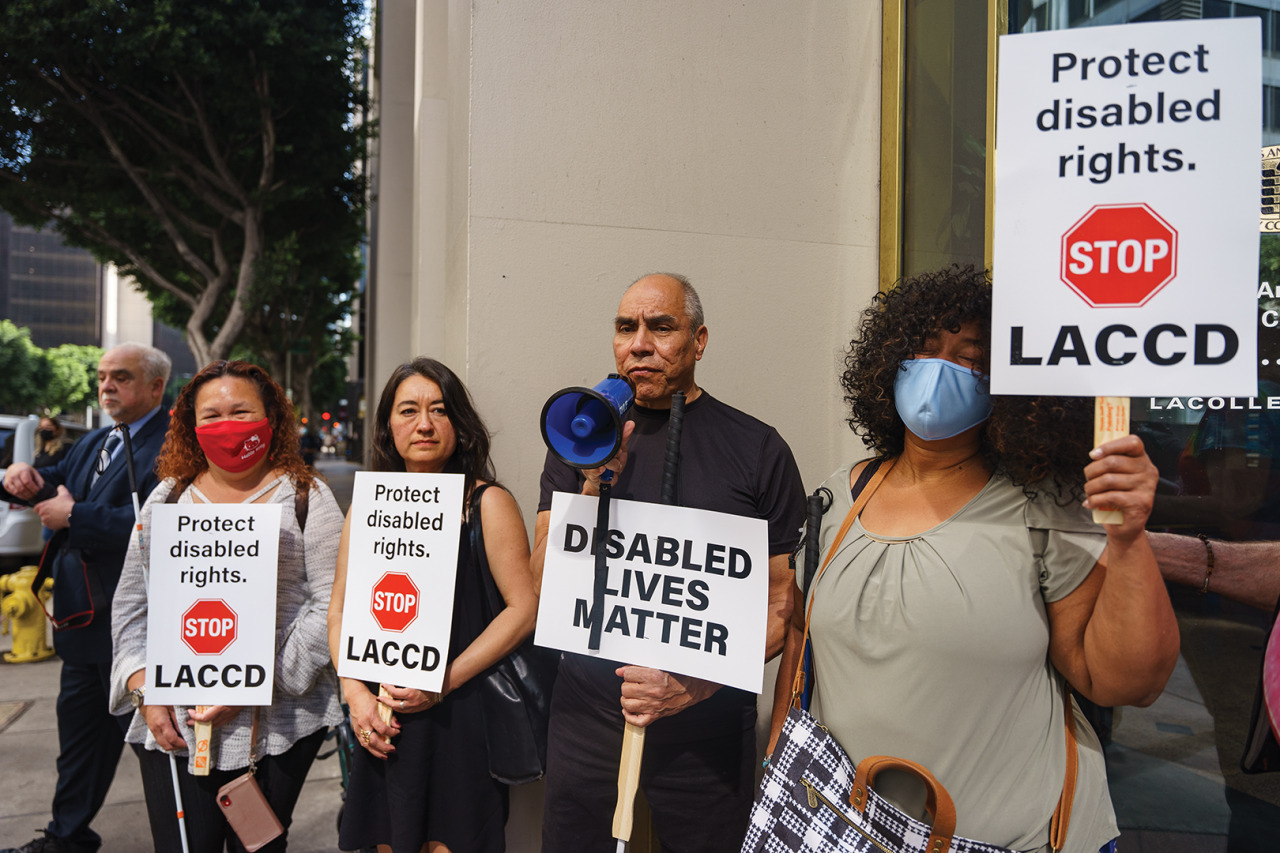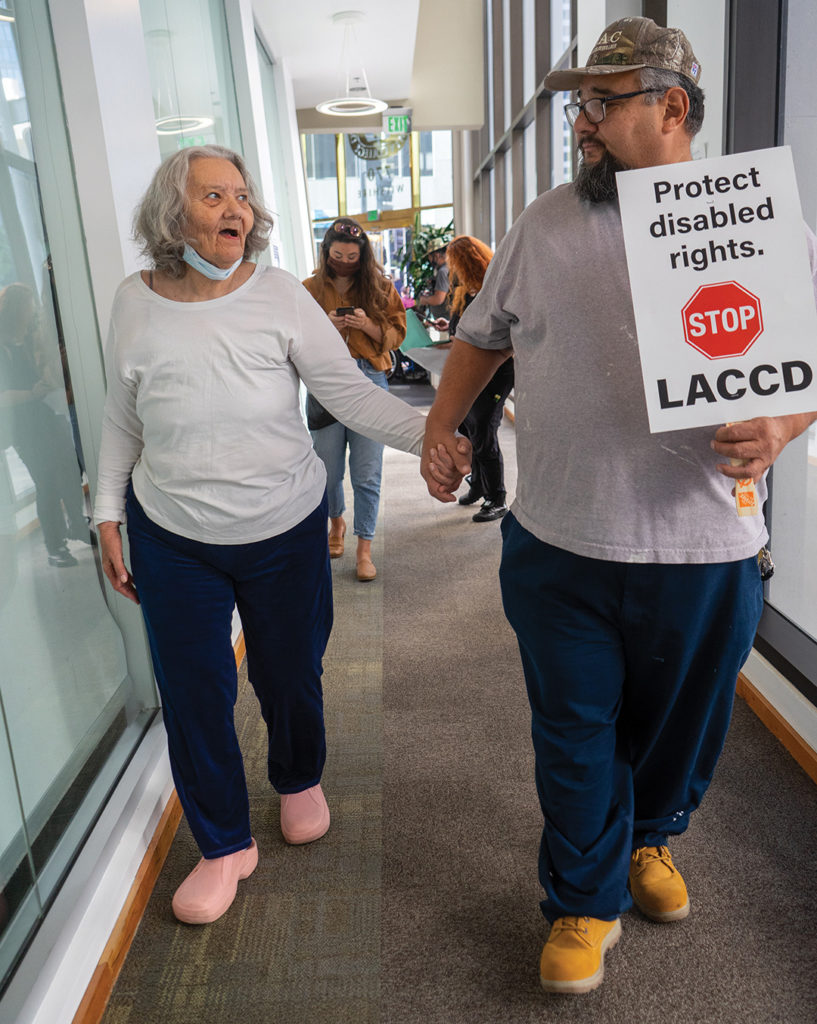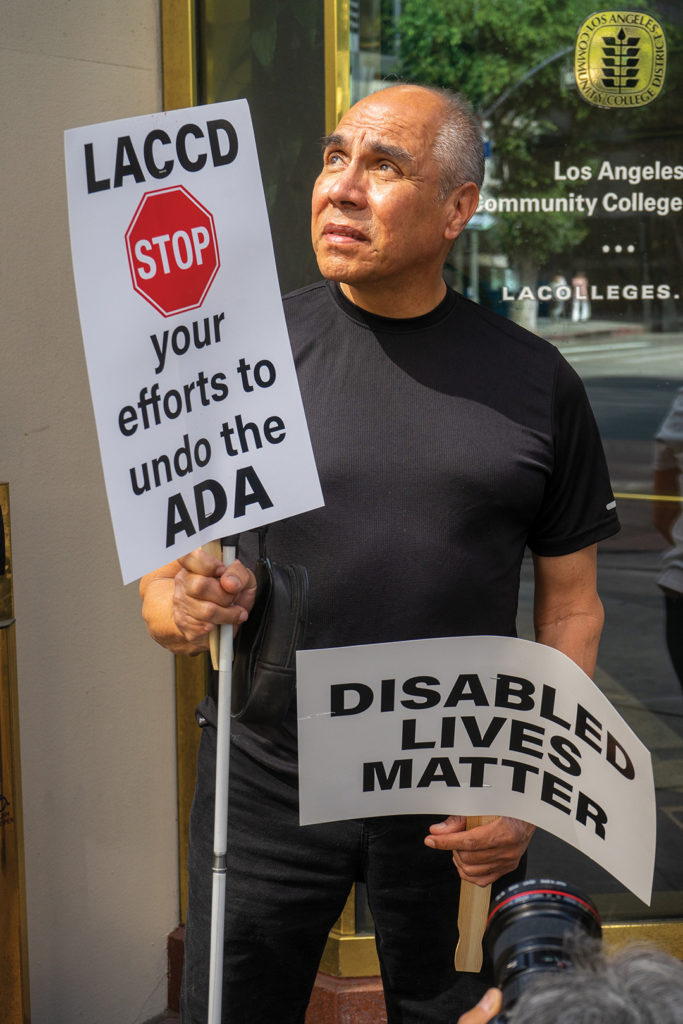Student journalists at the Los Angeles Collegian, the student voice of Los Angeles City College since 1929, have been hard at work this summer developing a special package of in-depth reporting with support from Cal Humanities. We are honored to present their work here.
Six years after blind students at L.A. City College filed a lawsuit against the Los Angeles Community College District, their lawyers prepare to argue a second time in front of the 9th Circuit Court of Appeals.
Three months of negotiations between the Los Angeles Community College District and lawyers for the plaintiffs, Portia Mason and Roy Payan failed.
The students’ lawyer, Patricia Barbosa, spoke with the Collegian at the begging of talks.
“Yes, we continue to negotiate, but I can’t discuss anything raised in mediation,” Barbosa said. “When we come to a decision, LACCD Board of Trustees will have to vote on it, and the vote will be public.”
Students allege in their lawsuit that the college failed to provide textbooks, handouts, syllabi and other classroom materials in Braille or an audio format that blind students could use. The students won their case in 2019, but the LACCD appealed the decision to the 9th Circuit Court of Appeals. The college district lost that appeal as well.
The LACCD argued that what happened at City College was “unintentional discrimination,” and on that basis has resisted providing students with accommodations described in the court ruling.
Supporters Rally Behind Disabled Cause
In February 2022, the LACCD appeared ready to take the case to the Supreme Court but faced pushback from students and activists. Some worried that taking the case to the Supreme Court would jeopardize the Americans with Disabilities Act (ADA). According to Disability Rights California (DRC), the LACCD’s petition would have challenged the very foundation of disability rights.
Over 900 participants attended the “Disability Rights are Civil Rights” meeting via Zoom hosted by the Association on Higher Education and Disability on Jan. 31, 2022. During the meeting, civil rights advocate Paul Grossman told attendees about the problem he says the LACCD created.
“This is the most serious matter in disability law in 20 years,” Grossman told attendees. “We are in a crisis.”
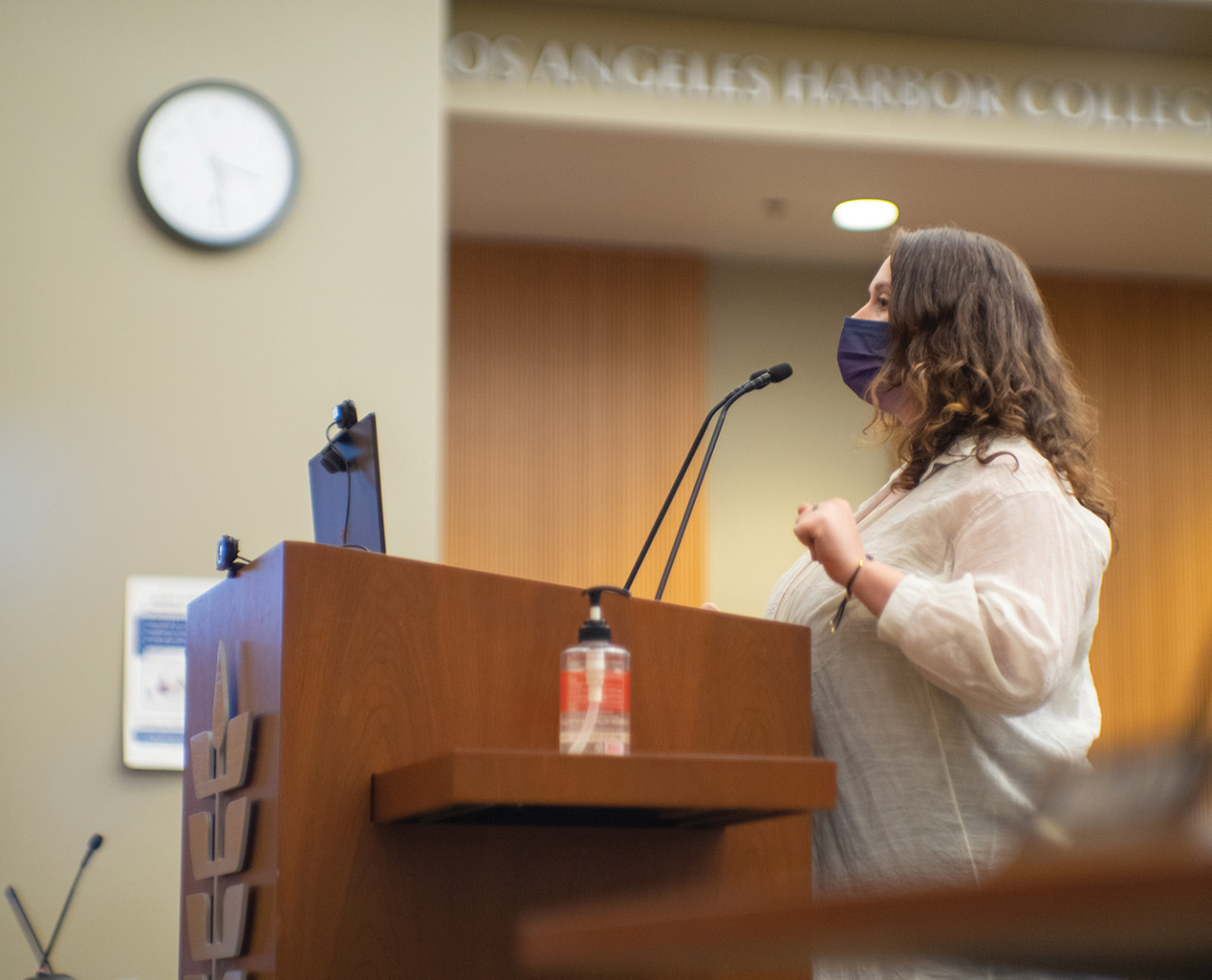
Grossman called the board’s plan “an illegitimate strategy.”
“It must be dropped immediately,” he said in February. “If [LACCD] is successful in this matter, the damage it would do would apply to every aspect of disability life.”
According to Grossman, the district plans to ask the Supreme Court to terminate the ability of any private parties to bring disability discrimination claims under section 504 of the ADA using the disparate theory of liability. According to the DRC, disparate impact discrimination means discrimination that is supposedly unintentional.
Title II of the ADA states that people with disabilities are protected from discrimination in services, programs and activities provided by state and local government.
Elizabeth Preger is an instructional assistant at LACC who lives with a disability. Preger attended the February meeting and says the district should have anticipated the need for accessibility because of the college’s proximity to the Braille Institute on Vermont Avenue. She also says everyone knows students have to take general education classes to transfer, and those classes should be accessible from the beginning.
“The fact that the board is considering going to the Supreme Court, it has already caused harm to my community,” Preger said. “They have a chance to stop that harm and try to make amends.”
Lawsuit is Not Just a ‘Disabled Problem’
Students from San Diego City College, L.A. Valley College and Palomar College attended a Feb. 17 meeting that was also moderated by Grossman. He told them that every student club and organization has a stake in what happens to disabled students. But they were not the only ones focused on the case. The Supreme Court petition drew the attention of state officials. The Collegian contacted the California Community Colleges Chancellor’s Office to ask Chancellor Eloy Ortiz Oakley how this lawsuit could affect the 116 community colleges in California.
“The State Chancellor’s Office is closely monitoring the court case and its potential consequences and urges both parties to work toward a negotiated settlement that avoids further litigation,” Vice Chancellor for Communications Paul Feist wrote in an email.
Lieutenant Governor, Judges Criticize District Actions
Judge Consuelo Maria Callahan of the 9th Circuit Court of Appeals used stern words to describe the way the LACCD complies with the ADA during an appeals hearing in February of 2021.
“You get money for students with disabilities,” Callahan said. “The district seems to take some sort of position that they don’t really have to do anything until someone comes in and complains, and I am pretty sure that the government expects a little more of you than that.”
The government does expect more. California Lt. Gov. Eleni Kounalakis warned the board against their current legal course in a letter dated Feb. 17, 2022. She urged the district to reconsider.
“The proposed petition is contrary to our state’s great traditions of civil rights and inclusion for everyone, including people with disabilities,” she wrote in the letter.
Kounalakis wrote that the district’s actions could “open the door for serious unintended consequences and challenge the very foundation of disability rights in the United States.”
Last March, the Board of Trustees said it would withdraw the Supreme Court petition the moment the parties reached an agreement. LACCD Board of Trustees President Gabriel Buelna issued a statement in which the board directed the district and its legal counsel to start negotiations and find a “mutually-beneficial resolution” for the case.
According to the statement, the board supports the ADA and welcomes persons of all abilities, regardless of background or ethnicity, to enroll at any of the nine colleges in the district.
The 9th U.S. Circuit Court of Appeals held that individuals with disabilities could sue over practices that have a discriminatory effect on them, even if no discrimination was intended, in an Aug. 24, 2021 hearing. However, Judge Kenneth Lee dissented.
“California is the birthplace of the disability rights movement, and our community college system is an essential path to education for Californians with disabilities. Blind students at LACCD are entitled to have meaningful and effective access to classroom materials, textbooks, educational platforms, and websites.”
— Lt. Gov. of California Eleni Kounalakis, from a letter to the LACCD Board of Trustees dated Feb. 17, 2022.
The Appeals Court judge explained his decision, saying that the district did not discriminate against blind students the way Section 504 defines discrimination.
“[Section 504] prohibits discrimination ‘solely by reason of her or his disability,’” Lee said. “But in choosing to use PeopleSoft program, the district did not discriminate against blind students ‘solely by reason of’ or ‘because of’ or ‘due to’ their disability status.”
LACCD used PeopleSoft to operate its website, but the program was not compatible with screen-reading software used by blind students.
Litigation Brings Change, Accommodations
LACC took steps to rectify this. Dr. Mary Gallagher was named president at L.A. City College in June 2018, two years after Payan filed suit. Even though the district handles the litigation, Gallagher has been following the case closely because it all started at City College. She says the school is doing everything it can to accommodate each student individually.
“Everyone’s accommodation is different,” Gallagher said. “The challenge is that we don’t know exactly what every accommodation would be on day one. We have to have them meet with us and talk to us about what it is they need to do, and then, we do what we can do to accommodate. We are highly motivated, and we are responsible to provide accommodations for students.”
Gallagher says several improvements followed the litigation.
“The compliance with the requirements on our websites is really good,” she said.
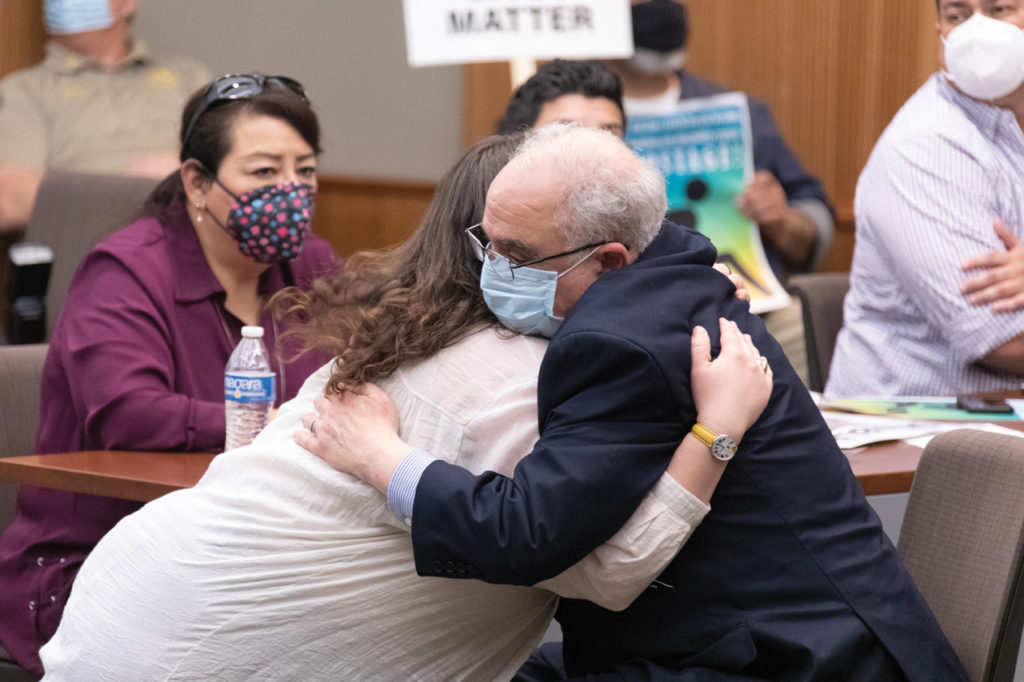
According to Gallagher, another benefit that came out of the lawsuit is that the campus hired an expert to assist the Office of Special Services (OSS) with accommodations for disabled students.
“He has certainly helped us tremendously in making sure that we have all of the technology available that will help students as well,” she said. “I think if you compare how things were in 2016 to how things are now, we do have more things in place. We do interact with the faculty more to make sure they understand that students must be accommodated.”
Gallagher says she expects to see positive changes in the math department. She also says the LACC Foundation provides tutors for students who go through the OSS on the first day of school.
Student Recalls Barriers for Disabled
The National Federation of the Blind and the National Federation of the Blind of California are also plaintiffs in the lawsuit. Payan and Mason have since moved on from L.A. City College. However, in an article published on Oct. 12, 2016, in the Collegian, both Payan and Mason talked about the accessibility barriers they faced on campus.
Payan claimed that LACC staff failed to provide class materials and software for his math class. Payan spoke about his time at City College and why he decided to file the lawsuit against the district during a Jan. 13, 2022 podcast for edsource.org.
Mounting Costs: Litigation costs in Payan, Mason v. LACCD reached $1.5 million in 2021. Judges estimate costs could reach $3 million by the end of the lawsuit.
Payan needed math classes like algebra and statistics to transfer to a four-year college. He says the problem was the software provided by LACC to all blind students to read textbooks and classwork aloud was not compatible with the math materials.
He claims he enrolled in several math classes, but for one reason or another, he was told to drop them. Payan says one math professor told him he could not enroll because he was blind and would slow the class down. Another professor told Payan he could not record the class, even though recording is a district-approved accommodation.
In a different class where recording was allowed, the professor did not articulate what he was writing on the board.
One day, Payan said he looked for a way to help his professor understand the struggles he faced. He asked the professor to sit in his place and face the back wall.
“So he sits down,” Payan said, “I get the dry-erase marker, and I start writing stuff.”
Minutes later, he asked the professor if he can tell what Payan wrote on the board.
“He goes, ‘Well, no, obviously, I can’t. I can’t see it.’ I said, ‘Well, welcome to my world. This is my world every day.’”
“None of us would have accepted an education like that and [blind students] shouldn’t have to.”
— Jean Zachariasiewicz of Brown, Goldstein & Levy, Plaintiffs’ Attorney
Payan said when he complained to the chair of the math department, they refused to help.
“So I asked him, ‘Why not?’ He said, ‘Because there’s not enough of you to warrant change,’” Payan said.
“What do you mean there’s not enough? Enough blind people?” Payan asked the chair.
His response was, “Yes.”
Payan said he then went to the dean of the department but received a similar response.
Barbosa has been Payan’s lawyer from the beginning. In 2016, she told the Collegian that there was no other solution but a lawsuit.
“We’ve done everything we’re supposed to,” Barbosa said. “That’s why we’re suing.”
Almost six years later, Barbosa says the district is not fighting the plaintiffs’ requests, but students’ rights to make complaints.
“We filed a motion to dismiss the claim for section 504, but LACCD is not interested,” Barbosa said. “Their view is that students should have no rights to make complaints unless they can prove intentional discrimination.”
According to Barbosa, intentional discrimination is not easy to prove.
“It means that you must prove actual malice and a desire to deprive someone of a civil right on purpose, not the neglect and ignorance shown by the OSS office and instructors at LACCD campuses,” she said.
Barbosa added that as of Feb. 18, 2021, the case is still in the same position and that the LACCD still plans to go to the Supreme Court, causing “great potential damage.”
LACCD Chancellor Francisco Rodriguez often spoke out in favor of accessibility and inclusion within the district, and he repeated that at the L.A. City College Graduation Commencement at the Greek Theatre on June 7, 2022. However, the chancellor has never agreed to sit down for an interview with the Collegian about disabled students and accessibility.
California Humanities awarded $150,000 in fellowship grants to 10 community colleges in California to support projects by emerging student journalists. Projects reflect the perspective of journalists and the “context and inquiry” of the humanities, as students develop media literacy and practice public engagement.
Students also receive support, feedback and advanced training in workshops organized by Cal Humanities. Participants are selected through a competitive process and come from L.A. City College, San Diego City College, San Francisco City College, Fullerton College, San Bernardino and other community colleges across California.

